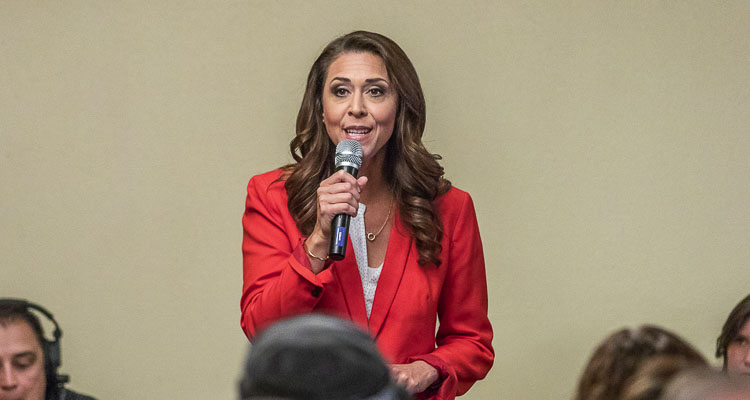Southwest Washington residents have voted down light rail by double-digit margins; continue to raise safety concerns, design limitation problems related to light rail
Congresswoman Jaime Herrera Beutler today (April 19) sent a letter to Interstate Bridge Replacement Program Administrator Greg Johnson reiterating Southwest Washington’s repeated rejection of light rail and proposing transit alternatives for the I-5 bridge replacement project.
Herrera Beutler’s letter follows reports of transportation officials moving toward light rail as the preferred transit option in the I-5 bridge replacement process.
In the letter to Administrator Johnson, Herrera Beutler highlights that Southwest Washington voters have repeatedly rejected light rail when it came up for a vote on a ballot.

“Light rail has been rejected – repeatedly – by voters in Southwest Washington by overwhelming margins. Whatever IBR officials see as the merits of light rail, they must be able to demonstrate that the transit component of the project is supported by the citizens who will use and pay for it. There is no such evidence that supersedes multiple votes of the people, which are the most fundamental demonstrations of community will,” Herrera Beutler wrote.
Herrera Beutler continued, “I serve as a senior member of the House Appropriations Committee, and I work hard to secure the funding for projects supported by the citizens of Southwest Washington. Conversely, if major components of a project are designed in conflict with the will of Southwest Washington citizens, I will work just as hard to make sure such a project is brought into harmony with the desires of the people I represent before it moves forward.”
The full text of the letter follows, and a PDF is available here.
Dear Administrator Johnson,
In light of the troubling recent reports that transportation officials within the Interstate Bridge Replacement Program (IBR) have already selected light rail as their preferred transit option in the I-5 bridge replacement process, I find it necessary to reiterate my strong opposition to light rail based on both the merits and on the clear preferences expressed by the people I represent.
Light rail has been rejected – repeatedly — by voters in Southwest Washington by overwhelming margins[1]. Whatever IBR officials see as the merits of light rail, they must be able to demonstrate that the transit component of the project is supported by the citizens who will use and pay for it. There is no such evidence that supersedes multiple votes of the people, which are the most fundamental demonstrations of community will.
The reasons for Southwest Washington’s opposition to light rail are numerous, not the least of which is a concern over public safety. A recent news report cites a 2017 study showing a majority of crime in Portland’s TriMet transit system occurred on light rail [2]. Since that time, public safety has become a top-of-mind issue given the spike in murders in Portland and rising crime in our local communities. Many citizens have expressed outrage to me that in a March IBR steering committee meeting, officials appeared poised to select the more dangerous mass transit option with no concrete details for how it would address the associated crime. If IBR officials are truly committed to data-driven decisions, then crime-related data associated with Portland’s light rail system must also be a factor. I recognize the challenge in doing so considering TriMet’s imprudent decision to stop tracking these statistics, but it remains necessary.
And I won’t overlook another flaw of light rail; the limitation it places on bridge height. Unfortunately, IBR officials have communicated that they are unable to design a bridge with light rail that is high enough to accommodate present and, equally important, future economic activity on the Columbia River. I won’t support a bridge that chokes off jobs upriver just to accommodate a transit system that the people I represent don’t even want.
As you know, bus and Bus Rapid Transit are alternative forms of mass transit that already serve commuters in this region. BRT would also qualify for federal transit funding, offers more flexibility than a fixed-rail system, and is a viable option for the I-5 project.
I serve as a senior member of the House Appropriations Committee, and I work hard to secure the funding for projects supported by the citizens of Southwest Washington. Conversely, if major components of a project are designed in conflict with the will of Southwest Washington citizens, I will work just as hard to make sure such a project is brought into harmony with the desires of the people I represent before it moves forward.




